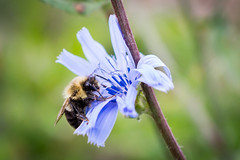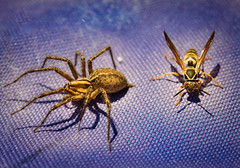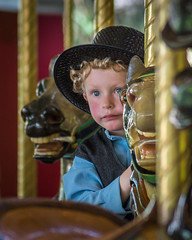Sony SLT-A55V
Doe Eyes
 On a walk along the trails of a Missouri nature center, we encountered this docile woodland beast. One look at that face and the meaning of the term “doe-eyed” becomes crystal clear.
On a walk along the trails of a Missouri nature center, we encountered this docile woodland beast. One look at that face and the meaning of the term “doe-eyed” becomes crystal clear.
Here’s the American Heritage Dictionary definition…
doe-eyed
adjective
1. Having wide-open, innocent-appearing eyes.
2. Credulous and unsophisticated; naive.
For a larger view, click on the photo.
The Stand Off

While photographing wildflowers I noticed yellow spiders hiding among the foliage. I believe they are in the crab spider family. They seemed to be waiting for prey to come by. That was, in fact, the case. (See some of my previous posts.)
I’d been photographing these yellow spiders on purple thistles. Then I noticed a similar spider on a yellow flower. While I was taking his picture, a soldier beetle landed on the flower. I wondered what would happen.
After taking a few photos, I decided to switch to taking video. I remembered nature films I’d seen where an alligator snatches an unsuspecting antelope that stopped for a drink. I thought this, on a decidedly smaller scale, might provide the same kind of drama.
I only got a short, six seconds of video. It looked like the solider beetle bumped into the spider and then flew off. Not too dramatic. However, when I slowed the video down, it turns out it was a much closer call than I originally thought.
Watch the video below and pay particular attention to the slow motion footage. When slowed down, you can see the spider actually grabs the leg of the soldier beetle in its jaws. The beetle is able to pull away before the spider can get a better hold. The best way to view it is to click the full-screen icon in the lower right corner of the video box.
Click on the photo at the top to see a lager version.
Compelling Clouds over Kewaunee

I was up early and on the beach one Saturday to catch the sunrise at Kewaunee, WI.
In addition to some nice sunlit images, (See Gold Rush and Early Amber Rising.) I also snapped a few in black & white mode. This one really captured the dynamic tonal range of the clouds above Lake Michigan, beyond the Kewaunee pier and lighthouse.
Click on the photo to see a larger version.
Fatal Attraction

I discovered yellow spiders hiding among the the thistles. I assumed they were waiting for unsuspecting prey. I took some photos, downloaded them to my computer and posted them to this blog under the title Dangerously Alluring Beauty.
 Several hours later, I went back to check on them. I was right! This is the same thistle and spider from the previous post.
Several hours later, I went back to check on them. I was right! This is the same thistle and spider from the previous post.
As you can see, a small bee, buzzing from flower to flower, attracted by the thistle, received an instant invitation to lunch.
The image on the right is the same scene from a different angle.
I wish I had hung around long enough to catch the action live. However, it just so happens, when I finished photographing this carnage, I noticed a similar yellow spider, poised with arms open wide, waiting for a its meal on a yellow flower. Then a bug came along. I started snapping pictures. The bug walked around the flower until it finally came face to face with the spider…and then…
You’ll have to watch for those images in a future post to see how it turned out.
To view larger versions of either of these photos, just click on them.
Dangerously Alluring Beauty

I went for another walk in the Missouri woods with my camera and noticed something new among the thistles.
 This yellow and black spider was strategically positioned and patiently waiting to strike insects who may be attracted to the colorful thistle.
This yellow and black spider was strategically positioned and patiently waiting to strike insects who may be attracted to the colorful thistle.
If you look closely at the image above, it looks like some of the thistle is twisted in strands to the side – giving the spider easier access to any prey that might land on the top of the flower. Is the spider smart enough to make an easier path to the kill or is it just a naturally occurring coincidence? I wonder.
The photo to the right show another spider snugly tucked deep in the strands of the thistle. Waiting…waiting…waiting…
Now that I look at them, maybe I should have waited to see and document what happens. It might have taken a long time with me just a few inches from the blossoms. The spiders are more patient than I am.
You can get a closer look at either photo by simply clicking on them.
Thistles on Display

I took a walk through the woods in Missouri and came across this clump of thistles.
I have a difficult time walking outdoors with my camera and not photographing every flower of color I encounter…even if I have a dozen images of the same kind flower…even when they’re weeds.
Here’s a little of what Wikipedia says about thistles…
Thistle is the common name of a group of flowering plants characterised by leaves with sharp prickles on the margins, mostly in the family Asteraceae. Prickles often occur all over the plant – on surfaces such as those of the stem and flat parts of leaves. These are an adaptation that protects the plant against herbivorous animals, discouraging them from feeding on the plant. Typically, an involucre with a clasping shape of a cup or urn subtends each of a thistle’s flowerheads.
In the language of flowers, the thistle (like the burr) is an ancient Celtic symbol of nobility of character as well as of birth, for the wounding or provocation of a thistle yields punishment.
The thistle has been the national emblem of Scotland since the reign of Alexander III (1249–1286) and was used on silver coins issued by James III in 1470. It is the symbol of the Order of the Thistle, a high chivalric order of Scotland. It is found in many Scottish symbols and as the name of several Scottish football clubs. The thistle, crowned with the Scottish crown, is the symbol of seven of the eight Scottish Police Forces (the exception being the Northern Constabulary). The thistle is also the emblem of Encyclopædia Britannica, which originated in Edinburgh, Scotland. Carnegie Mellon University features the thistle in its crest.
According to a legend, an invading Norse army was attempting to sneak up at night upon a Scottish army’s encampment. During this operation one barefoot Norseman had the misfortune to step upon a thistle, causing him to cry out in pain, thus alerting Scots to the presence of the Norse invaders.
You can see a larger image of the thistles by clicking on them.
Bathed in Beams

On more than one occasion, I’ve heard or read Algoma, WI has one of the most photographed lighthouses (technically a “pier light”). I always considered it more wishful thinking than fact. But if I just count the number of pictures I’ve personally snapped and posted, I might have misjudged.
This magical scene was captured early on a Sunday morning while on my way to church. (As the pastor, I get to the church hours before the service to prepare.) Since I always have my camera with me, it’s not unusual for me to stop near the harbor and step out to take a few photos of the lighthouse if I see something I like.
On this morning, when I stopped, it was starting to sprinkle and I didn’t want to expose my camera or suit to the rain. So, instead of jumping out, I jumped in…to the backseat of our minivan. I set my tripod and camera up, slid the side door open and snapped away, staying comfortable and dry. As the sun continued to rise and the clouds shifted, changing the angle of the beams, I had jump back to the drivers seat and move my van 3 times.
I posted a B&W photo from the same morning a few days ago, entitled Too Wonderful for Me.
Here’s a panoramic scene, taken just a few minutes later the same morning, when the sunbeams weren’t so intense.
Click on either image to see a larger version.
The Girl with Golden Locks

The pursuit of truth and beauty is a sphere of activity in which we are permitted to remain children all our lives. ~ Albert Einstein
This photo was mostly an accident…something I just stumbled into. Didn’t realize what I had until I was browsing through a batch of photos from the day. The sweet, little girl in the big field grabbed my attention.
I cropped the original, tweaked the contrast and exposure, enhanced the colors, added an effect to soften the foreground and background…and found an image I love.
If it appeals to you, by all means, share it with others.
Click the image to see a larger version.
All of the photos I post are available for purchase. If you’d like to buy one, click on the blue “Buy this Online” bar below for a variety of print and frame options or contact me for digital purchase and licensing options. ![]()
Gold Rush
On the Wing

These are Sand Hill Cranes that spent the night in the farm field across the road from our home. They are a very exotic and, unfortunately, elusive bird. I’ve not been able to get close enough to capture any decent pictures.
There were at least a dozen Sand Hill Cranes sharing the field with three or four times as many Canada Geese. I tried to slowly work my way toward them, but before I could get any worthwhile photos they took off. The only saving grace is that a few happened to fly by on their way to some other secluded spot.
Sand Hill Cranes are graceful and somewhat majestic in flight, with a wingspan of six to eight feet. They are also very noisy when flying. (They can be pretty noisy on the ground, too.) Their distinctive “call of the wild” has been described as a bugling or trumpeting sound. It’s very annoying, particularly early in the morning when you’re trying to sleep in. They can be heard long before they are seen.
To see a larger view of either image, simply click on it.





















































